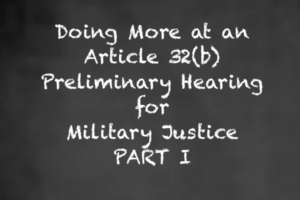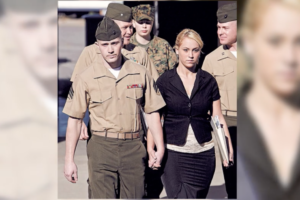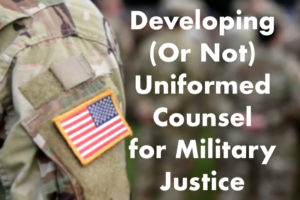
The notion of well-rounded judge advocates combined with recruiting counsel that lack interest or experience in criminal law and revisions that continue to gut the rights of the accused are joining forces to create a crisis of colossal proportions in the military’s justice system. Bankrupting the ranks of military criminal law specialists especially stacks the deck against a military accused beyond limiting the proficiency of the pool of uniformed defense counsel available to represent him.
MILITARY PROSECUTORS
Some in the community may believe that having inexperienced military prosecutors benefits a military accused. I would agree but only in part. Aside from making the act of trying a case painful when the military prosecutor is inept, when military prosecutors lack experience in criminal law, they are far more inclined to recommend to the commander to go forward on a case than she would otherwise. And that prosecutor’s opinion, even in those cases when she recommends against prosecution, will not carry weight when her resume lacks substantial experience or the conviction of someone comfortable with the subject matter. Further the military prosecutor that lacks knowledge and judgment will not be able to help guide an investigation that seeks the facts, instead of a one-sided pursuit for information that weighs in favor of guilt.
A military prosecutor that fails to comprehend the rules will also be an impediment to expeditious and fair process. The most common reason that military trials are delayed is that the trial counsel / convening authority has denied a resource for the defense. Among those resources denied are the production of defense witnesses for trial, defense experts for consultation, and discovery of evidence. Even when a defense counsel provides sufficient information to trigger the appropriate grant, trial counsel that do not know better have a default to deny the request. In the majority of cases, I attribute this denial to a material lack of appreciation for the rules. That lack of appreciation is directly attributable to the inexperience of the counsel.
I blame the current policy of the judge advocate leadership to encourage “broadly skilled” judge advocates and the lack of a criminal law specialty tract in all but the Navy.
I also blame recruiting. When the economy began to tank and legal employment opportunities with it, a huge increase of future graduates from “top tier” law schools sought refuge in military service. And the services did not act as appropriate gatekeepers, permitting their admission ever impressed by the names and prestige those names carried. The ranks filled with judge advocates that have impressive pedigrees but lacked even fundamental skills in trial advocacy.
Many Ivy League law schools do not require their graduates to take a basic course in evidence. Let that wash over you for a moment. Why would that be? Because Ivy League law schools and those that attend them largely do not think highly of criminal litigation. Prosecutors do not rake in the funds that private firms offer where transactional law and all things corporate burn deep, and profit and profitability reign. Ivy League schools admit those with promises of high paying salaries, but when the economy suffered, so did the opportunities to convert that focus into employment. Graduates from such schools that found themselves unable to convert their “golden ticket” of admission to lucrative employment turned to military service to ride out the economic downturn, and these judge advocates largely do not have the “fire in the belly” for litigation. They largely lack interest or passion in it and tend to care little about well representing the government in such matters. They often leave work by 1700 every day and rarely dedicate themselves to the individualized pursuit of establishing a level of excellence in the field. Who suffers? Everyone, especially the military accused. How so? Because for the counsel that carry too many clients or are too inexperienced themselves to know better, when that inexperienced prosecutor denies witnesses, evidence, and experts, he does not bother to compel them. It takes time, and it takes know how. The result is that the military accused heads to trial unprepared to meet the government’s evidence.
JUSTICE SUPERVISORS
Sadly, those that are supervising military justice practitioners often lack the experience necessary to guide new counsel to the right and learned path. More often than not, the senior trial counsel or chief of military justice in any given jurisdiction may have one-year experience at being a trial counsel and that trial counsel time largely lacked good and appropriate supervision. In most scenarios, senior defense counsels (the first line supervisor for defense counsel) have never served as trial defense counsel, though they typically have experience as military prosecutor.
STAFF JUDGE ADVOCATES
There is an entire generation of staff judge advocates that lack relevant let alone recent experience in practicing criminal law. As the senior legal advisor to the general court-martial convening authority, the staff judge advocate advises him about what cases to refer to court-martial and later grants of expert assistance and still later requests for clemency. For those that argue the staff judge advocate need not have recent or relevant military justice experience because he relies on his chief of military justice, I can only highlight that reliance only works when the chief of military justice knows his job; too often he does not. A comedy of errors ensues where no one is laughing, not the least of which is a military accused.
There is a host of military judges that are experienced and for whom I hold the deepest respect and admiration; and then are those that you find yourself asking, “how did this person make it to the bench?” I believe I recently received the answer to this conundrum in a conversation with a newly appointed non-Army judge. Apparently during the introductory phase of a recent iteration of the military judge’s course in Charlottesville, Virginia, the speaker announced that the judges in the course had not been selected based on their experience or knowledge of criminal law, but rather these new judges had been chosen for their temperament and demeanor. What?! They are expected to be nice to counsel, so that qualifies them to be for all practical purposes the last guardians of justice? Hardly. But apparently in this kinder, gentler military being patient and sweet will land you on the bench. How very comforting for the military accused facing as much as life without parole and sex offender registration.
EMBRACE SPECIALIZATION & LOOK BEYOND THE SHINY PEDIGREE
Beyond the issue of continued reforms that serve to deny fair process to a military accused, the leadership of the Army, Air Force, and US Marine Corps need to embrace criminal legal specialization while they still can influence the transition and effectuate an appropriate balance. Criminal law career tracks are coming, whether you approve of them or not. Choose to value institutional knowledge.
Those charged with screening applicants and in accessions for entry need to look beyond the shiny pedigree of applicants from “top tier” schools to grow a generation of capable trial practitioners that will know they are valued for their proficiency and have a future in the service.
To do otherwise will result in even more gridlock in military courts, the docket will continue to stall, and “justice” will grind to a halt.
You Might Also Like These Articles Doing More at an Article 32(b) Preliminary Hearing – for Military Justice PART I I know, here she comes again,… Military court martial convictions are able to be appealed. Depending upon the sentence that is announced in your case, there… It is not my job to develop uniformed counsel. Each of the services has an organization charged with training its…






 REQUEST A CONSULTATION
REQUEST A CONSULTATION 